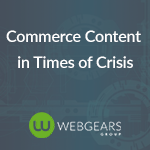
Ever since Webgears was born of the Great Recession in 2010, we’ve run a lean business. Even as the economy rebounded, we turned down the opportunity to take on large outside funding, instead making a strategic choice to prioritize quality, efficiency and sustainability over rapid expansion. That choice is paying off for us now as we find ourselves in the midst of a new recession, this time due to the COVID-19 pandemic.
From economic drivers to Google algorithm updates, the affiliate marketing industry – and specifically commerce content platforms – are notoriously susceptible to external forces. Whereas other companies in our space have potentially had to deliberate over potential layoffs, reductions in necessary discretionary investments or even delayed payment commitments to strategic partners, we remain uniquely poised to weather the storm – and, in fact, thrive in it.
As the pandemic continues to disrupt the worldwide economy, we’ve spent some time reflecting on the choices we made that set us up for success in this volatile market. The following are a few things we’ve learned along the way, which we hope can help other companies trying to figure out how to get by in this new normal.
Sometimes, slim is better than sexy
When our founders launched Webgears in the midst of the Great Recession, they knew that they wanted to help save as many people as much money as possible – and, taking note of the mistakes other companies had made during the economic downturn, they resolved to run the business sustainably, without a “bottomless bank account” from outside investment.
Of course, this approach was necessary in the company’s early days due to the terrible state of the economy. But even as the economy recovered and we became more comfortable and profitable, we remained self-funded and ruthlessly dedicated to efficiency and results. Over the past few years specifically, while our competitors raised money, went on hiring frenzies and spread themselves thin with constant international expansion, we made the conscious decision to focus on performing strongly in just our three core markets – Germany, the U.S. and the U.K.
Everyone is an essential worker
We’ve also consistently kept our team lean at only 35-45 employees. Because our founders baked efficiency into the company’s DNA, our mindset has always been that rather than throw money (or new hires) at problems as they arrive, it’s better to seek out and explore all alternative solutions first, especially those focused on automating formerly manual processes and functions. That means that we hire only when necessary to fill a key role, rather than just because there’s more work to do.
Doing things this way isn’t just a cost-saving measure. It’s also an innovation driver: we frequently come up with new processes going through this exercise, which allows us to find efficiencies and automate activities that other companies would have handled manually.
More financial freedom and fewer “non-essential” team members also means more job security for our team. Not only have we not had to lay anyone off, we’re actively investing in innovation resources and hiring developers to take on the radical consumer shifts of more people shopping online, who we expect to be retained in the mid-to -long term.
Fewer disruptions = higher partner satisfaction
Our self-funded approach allows us to make our own decisions when it comes to our strategy and our relationship with our partners. Other companies don’t have this luxury and are influenced or susceptible to their external investors.
This stability allows us to ensure our media publisher partners never need to worry about us meeting our financial or other service agreements from one month to the next, regardless of any negative external events outside of our control, such as the COVID-19 pandemic. Each individual partner also never needs to worry about a lag or downgrade in service, due to a performance downturn or unanticipated disturbance to another of our strategic partners. Others with finer margins will always run the risk that a significant downturn for one of their publisher partners could severely affect their financial standing, and therefore affect their ability to ensure simultaneous top performance and service levels for the remainder of their partners.
Lean doesn’t mean less than
Finally, the end result of a lean and efficient approach should still net the same or better results as you would receive from a more wasteful approach. Just because we don’t have the same staff size or footprint as some of the more “wasteful” companies doesn’t mean we aren’t as good of a solution for our partners.
Overall, we were well positioned going into this downturn, and we will be even better positioned when we emerge on the other side. We hope these tips will help some other companies themselves for success during this difficult time.

Recent Comments